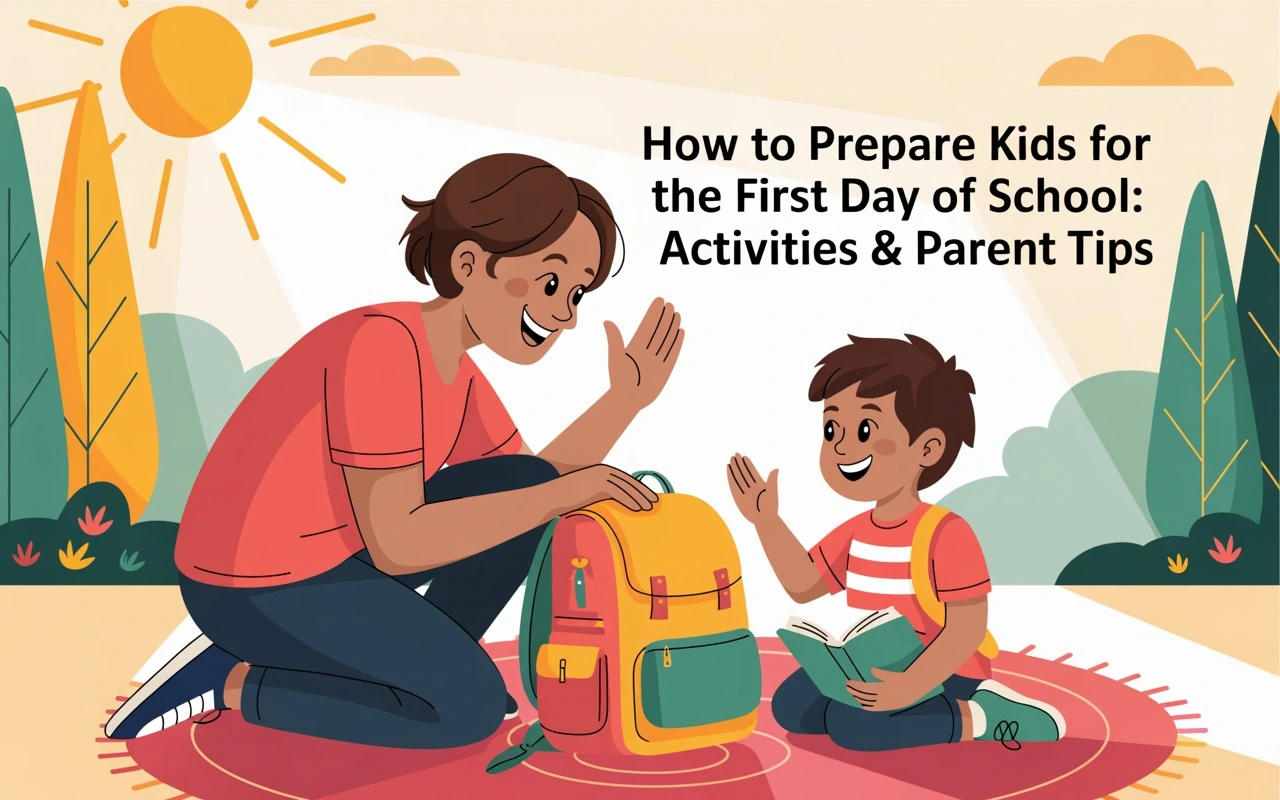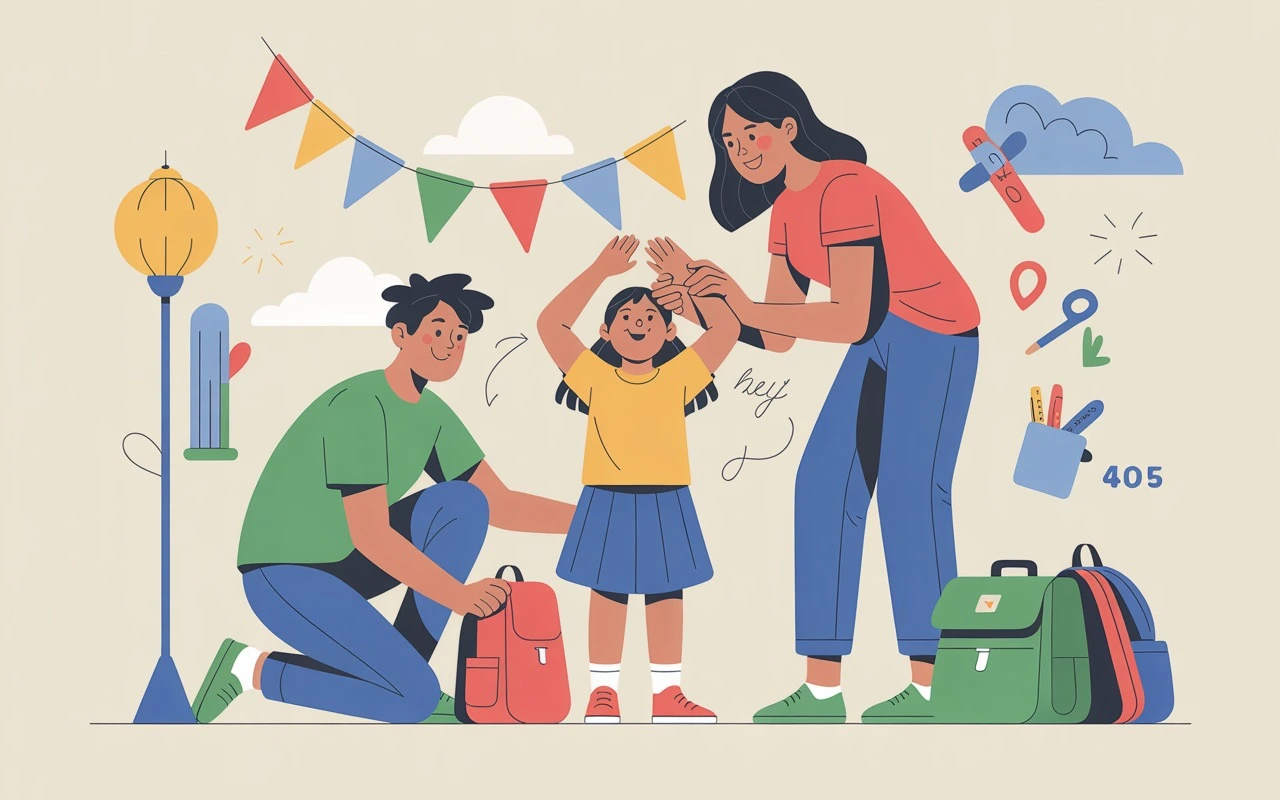How to Prepare Kids for the First Day of School Activities & Parent Tips




Summer vacation is almost over, and most schools are set to reopen in the first week of June. We hope you and your children had a fun and relaxing break.
As the new school year begins, many kids will be stepping into kindergarten for the first time, while others will be returning after the holidays.
This time is filled with excitement for parents and students. Whether it's a new school, a new classroom, a new teacher, or a brand-new school uniform, the first day always feels special.

The first day of school is a significant milestone for children and their parents. Whether your child is starting kindergarten or returning after a long break, the first day can bring a mix of excitement and nervousness. So, how do you make it simple?
In this blog, we’ll cover:
Let’s make this day a positive and memorable one for your child.
Before we move into activities and tips, let’s get the basics right. Packing the right items ensures your child is ready and feels secure.
Not sure what to take on the first day of school? Whether it's your child’s first day of kindergarten or they're moving to a higher class, being well-prepared helps your child feel more confident. These are some helpful parent tips for the first day of school to make sure nothing important is missed.
The night before school reopens, go through this checklist together with your child. It also helps calm their nerves and gets them excited for the new school year.
After school, make time to ask about their first day of school activities. Listening to their experience can make a big difference.
Schools use creative and warm ways to make the first day exciting and stress-free. These first days of school activities help break the ice, build friendships, and ease kids into their new routine.
Each student wears a blank sheet on their back. Others walk around writing kind words or compliments. At the end, students read what their classmates wrote—it’s a great confidence booster.
Students get a worksheet with questions like “What’s your favorite food?” or “Do you like cricket?”
They must find classmates with similar answers, this sparks conversations and creates bonds.
In groups, students decorate classroom walls using posters, charts, or drawings. It promotes teamwork and helps children feel like the classroom is their own space.
Pass around a jar of coins. Students pick 2–3 coins and share one fact about themselves for each coin. It encourages sharing and listening.
Give each child a small welcome kit (with pencil, eraser, sweet treat). Ask them to introduce themselves before collecting their bag. This works well with younger kids.
Give students a list of classroom objects or spaces and tell them to find. It helps them get comfortable with their surroundings while working in pairs or small groups.
Students draw or write about themselves and present their work. This promotes creativity and helps teachers and classmates learn more about each child.
Older students can share two true statements and one false one about themselves. The class guesses the lie, it’s fun, engaging ,and interactive.
Each child writes a note to their future self or brings an item that reflects their personality. The capsule is opened at the end of the year, perfect for reflection.
Ask kids playful “Would you rather…” questions like “Would you rather have a pet elephant or a pet lion?”
Great for sparking laughter and conversation.
Ask students to make a name badge or a bookmark showing what they love or what they want to learn. It sets personal goals and encourages expression.
Want to know how to help your child have a comfortable first day? Here are tried-and-tested parent tips for the first day of school:
Start the conversation early. Explain what happens at school, how teachers are there to help, and what your child might experience. Share your own fun school stories to build excitement.
If allowed, visit the school before Day 1. Show your child their classroom, play area, and entrance. Familiar places help reduce anxiety.
Begin sleep and wake-up routines a week before school starts. Also, practice the morning drill: getting dressed, eating breakfast, and packing the bag.
Let your child share their feelings. It’s okay to be nervous. Reassure them that it’s normal and that you’ll be there at the end of the day.
Teach your child simple ways to make friends, smiling, saying “Hi,” or asking to join a game. Role-playing these interactions at home can help.
Make sure all essentials are packed and labeled. Having everything ready reduces stress for both of you.
Briefly introduce yourself and share any important info about your child (e.g., allergies or shyness). Open communication helps the teacher support your child better.
Start with a favorite breakfast and take a cute photo. Plan a fun activity or treat for after school—it gives your child something to look forward to.
Do a trial run to the school. Whether walking, driving, or taking the bus, make sure your child is comfortable with the route.
Children pick up on your emotions. If you stay calm and cheerful, they’re more likely to feel confident too.
If your child is moving to a new class or feeling unsure about the subjects, now is the right time to give them the support they need.
At Interval Learning, we offer:
Classroom-based personalised tuition – For students who need one-on-one attention and guided learning in subjects like Maths, Science, English, and others. Our expert tutors are trained to allow every child to get the focus they deserve.
Foundation Programs – Perfect for students who want to build strong basics. Ideal for those in primary and middle school who want to improve understanding and confidence in core subjects.
Bridge Courses – If your child is stepping up to a new class and needs a quick revision of the previous year’s topics, this course will help them catch up and feel ready.
We understand that every child learns differently. That’s why our expert teachers create customized plans that match your child’s pace and level.
Visit Interval Learning website or reach out to us to know how we can support your child’s academic and non-academic journey.
The first day of school marks the start of a new journey. With the right preparation, fun classroom activities, and supportive parents, kids can step into school with confidence and joy.
Whether you’re packing your child’s bag, planning your morning, or helping them settle into a new class, remember, your support means everything.
Explore engaging learning tools and brain development kits at Interval Learning’s Magic Lamp, designed to make education joyful for young minds.
Your child should carry a school bag with notebooks, pencils, erasers, water bottle, lunch box, ID card, and any items requested by the teacher. You can also pack a small handkerchief and a change of clothes if it’s your child’s first day of kindergarten
Start preparing a few days earlier. Fix their sleep schedule, talk positively about school, and involve them in packing their bag. These parent tips for the first day of school help reduce stress and build excitement.
It’s normal to feel nervous. Stay calm and give them small reassurances. Let them take a comfort item if allowed. A quick goodbye with a smile works better than a long emotional one.
Pack a healthy and easy-to-eat lunch along with a small snack. Avoid too many items, especially for younger kids. Also, check with the school about food policies.
Most schools plan fun and simple first day of school activities like storytelling, coloring, name games, or classroom tours. These help children feel comfortable and make new friends.
If your child is jumping from one class to another and needs to revise or strengthen their basics, consider joining Interval Learning’s Foundation Program or Bridge Course. These are specially designed to help students build confidence and cover any learning gaps.
Yes, Interval Learning offers personalised tuition and classroom programs that focus on individual attention. If your child needs support beyond regular school, we’re here to guide them every step of the way.